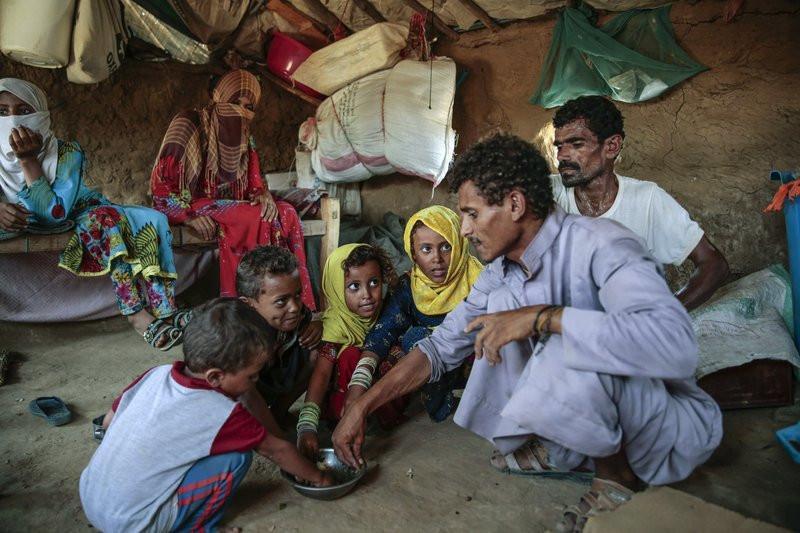
In this Oct. 1, 2018, file photo, a man feeds children halas, a climbing vine of green leaves, in Aslam, Hajjah, Yemen. (AP File Photo)
The World Food Programme said on April 9 it will halve the aid it gives to people in parts of Yemen controlled by the Houthi movement from mid-April after donors cut funding over concerns the Houthis are hindering aid deliveries.
The funding gap comes as Yemen is bracing for a potential outbreak of the novel coronavirus that would be devastating in a country where a five-year war between the Houthis and a Saudi-led coalition has wrecked the health system and spread hunger and disease.
"WFP's operation in Yemen is now facing a critical funding shortage and is left with no choice but to reduce assistance by half to avoid a full stop of assistance in the future," a WFP spokesperson told Reuters.
From mid-April families will get WFP aid every other month, instead of monthly. The United Nations WFP feeds more than 12 million Yemenis a month, 80% of them in areas controlled by the Houthis, who ousted the internationally recognized government from power in Sanaa in late 2014.
"WFP calls on the de-facto authorities to honor agreements and to introduce the confidence measures needed for donations and full operations to resume," the spokesperson said.
Donors, humanitarian agencies and U.N. bodies have in recent months increasingly complained of interference and obstruction from Houthi authorities and threatened to scale down aid if conditions did not improve.
Major donor the U.S. Agency for International Development (USAID) two weeks ago said it had started to reduce aid to Houthi areas over those concerns.
The Supreme Council for the Management and Coordination of Humanitarian Affairs, a Houthi body formed in November to oversee aid, did not respond to a request for comment.
Other aid agencies joined together last month to negotiate with Houthi authorities to facilitate access and accountability, aid sources have told Reuters. They said some progress on certain issues has been seen in recent weeks to improve the operating environment, but challenges remain.
While some money for coronavirus specific projects is coming in -- including $26.9 million from the World Bank and $25 million from Saudi Arabia this week -- the wider funding problem persists.
The U.N. humanitarian coordinator in Yemen, Lise Grande, told Reuters that 31 of the United Nation's 41 major programs in Yemen will be reduced or cut in April without more funding.
“The funding crisis is real and will have a catastrophic impact, just as COVID-19 is threatening the country. Nearly every aspect of the operation is at risk," she said.
Saudi-led ceasefire begins
A nationwide ceasefire in response to the global coronavirus outbreak went into effect in Yemen on April 9, raising hope for an end to the five-year-old war that has pushed millions to the brink of famine.
A Saudi-led coalition fighting Yemen's Houthi movement said it would halt military operations from 0900 GMT for two weeks in support of United Nations efforts to end the conflict that has killed more than 100,000 people.
The Iran-aligned Houthi movement, which controls the capital Sanaa and most big urban centers, has yet to announce whether it will follow suit in what would be the first major breakthrough in peace efforts since late 2018.
The coalition said its move is intended to facilitate talks sponsored by U.N. envoy Martin Griffiths for a permanent truce, motivated in part to avoid a potential outbreak of the new coronavirus, though no cases have been reported in Yemen.
U.S. Secretary of State Mike Pompeo in a statement said Washington welcomed the ceasefire announcement and urged Houthis to respond in kind to the coalition's initiative. He called on all parties to cooperate with Griffiths' efforts for talks.
In a statement, U.N. Secretary-General Antonio Guterres urged the Saudi-backed government and the Houthis to engage "in good faith and without preconditions" in the talks to agree on a nationwide truce mechanism, humanitarian and economic confidence-building steps and a resumption of negotiations on a political settlement.
"We are tired of the war," said 49-year-old Abd al-Basset Muhammad, who owns a juice shop in the southern port of Aden, the interim seat of the Saudi-backed government. "If the war hasn't already killed you, you are dying of hunger or disease."
Yemen has been mired in conflict since the Iran-aligned Houthis ousted the government of Abd-Rabbu Mansour Hadi from power in Sanaa in late 2014, prompting the coalition to intervene in March 2015 to restore him. The Houthis say they are fighting a corrupt system.
The conflict, widely seen in the region as a proxy war between Saudi Arabia and Iran, has been in military stalemate for years. Riyadh last year took over most of the costly and unpopular military campaign after coalition partner the United Arab Emirates significantly scaled down its presence.